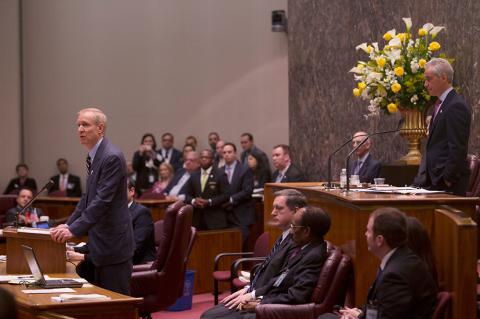Springfield politics are confusing enough for the casual observer these days. Imagine the challenge for Mayor Rahm Emanuel.
There’s the General Assembly with super-majorities from his own party in each house, locked in battle with a governor who’s a longtime friend and ally.
What to do? One solution is to lie low. On Monday, when Gov. Bruce Rauner offered $200 million in aid to CPS in a package that would allow local governments to opt out of collective bargaining, Senate President John Cullerton called the proposal “unacceptable.” Emanuel declined to comment.
Last month, when Rauner proposed a pension package including much of Emanuel’s wish list (including a Chicago casino), the mayor embraced the parts he liked but ignored the anti-union poison pill proposals, instead chiding Rauner for his personal attacks on House Speaker Michael Madigan.
Emanuel and Rauner have had a long, well-documented association, starting 15 years ago during Emanuel’s investment banking days and including sharing incredibly expensive wine at Rauner’s retreat in Montana. They share a donor base of rich people who favor austerity and dislike unions. Before being elected governor, Rauner was referred to as a mayoral adviser, prominent among the business leaders in what the Chicago Reader called “the mayor’s millionaires club.”
But their earliest known joint political project has particular resonance today. That was in 2011, when Emanuel was a shoo-in candidate for mayor and Rauner had just invited the corporate school reform group Stand For Children to expand into Illinois.
SFC expanded in a big way, dropping an unprecedented bundle on legislators, two-thirds of them Democrats. What they got was a bill that made it easier to fire teachers—and gave Emanuel a boost in upcoming contract talks with Chicago teachers by removing working hours as a subject of negotiation. It also required a 75 percent vote for teachers to approve a strike; SFC assured Emanuel that would effectively prevent teachers from striking.
Today (according to Rauner at least) Emanuel is seeking a similar legislative shortcut for negotiations with the Chicago Teachers Union: a law eliminating the 7 percent pension pickup that CPS has been paying for 30 years. Without new legislation, eliminating the pickup would constitute a pay cut (which is, of course, the reality) and be legal grounds for a strike.
The problem is that Rauner wants the favor returned, in spades and with exclamation points. He wants local governments and school boards across the state to have the option of unilaterally removing subjects for collective bargaining with their employees. And not minor subjects, either – things like wages, health insurance, job security, and subcontracting.
“Why does Chicago ask the state to take things out of collective bargaining to benefit Chicago,” Rauner has asked, “but doesn’t allow the state to authorize all communities, all school districts, to manage collective bargaining as they see fit?”
So far, Emanuel has no answer to that question.
He’s in a difficult position. As a politician operating in the Democratic Party, he can no longer give free rein to his animus against unions.
At one time he could. As an original New Democrat, he made his bones in the Clinton administration muscling through the North American Free Trade Agreement over union opposition; in the Obama administration he’s remembered for cursing out the autoworkers union in the course of the bailout of GM.
In his first campaign and early in his mayoralty, he made his hostility to teachers well-known (teachers got raises while “kids got the shaft”), and he ratcheted up an unnecessary confrontation with city workers over work rules, without ever discussing it with their unions.
But things change. In its 2012 strike, CTU handed Emanuel a major defeat. And in the wake of the Great Recession, income inequality became the new cause of the Democrats, and union-bashing was suddenly out.
Dragged along by the spirit of the times, and chastened by his losses in the teachers strike and the first round of this year’s mayoral election, Emanuel has adapted somewhat. When he raised the minimum wage, closed downtown TIFs (a move suggested by challenger Jesus Garcia during the recent election and opposed by Emanuel at the time), and backed an ordinance requiring transparency in privatization deals, he must have upset many of his core supporters. Although on pension reform, which is a big-ticket item, he continues to make reductions in workers’ retirement benefits a priority, regardless of what the state’s constitution says.
“In private, it’s a pretty constructive conversation,” Rauner recently said of his relationship with Emanuel. “In public it’s not.” One can imagine the private talks, a wistful Rahm saying, “I wish I could help you with that....In the old days....”
On one issue—and it’s the most fundamental issue—Rauner and Emanuel stand arm-in-arm. Both oppose the kind of progressive revenue solutions that would target the millionaire class to which they belong and which they represent—the kind of solutions that offer the only realistic path out of the fiscal crisis in which the state and city are mired.
Some principles transcend party politics.
Curtis is a blogger for The Chicago Reporter.


Spread the word